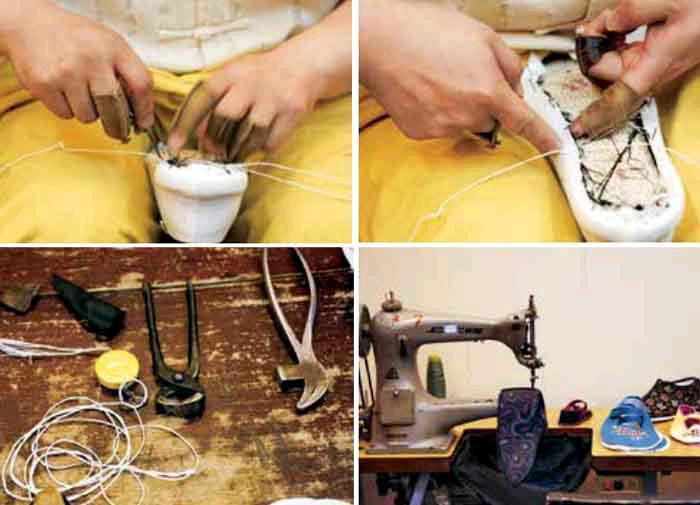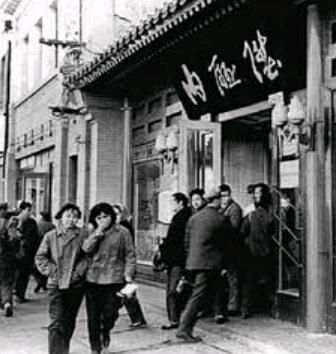A New Soul for Old Shoes
2017-11-27byZhangJinwen
by+Zhang+Jinwen
Like so many other time-honored brands, Neiliansheng is legendary. From the late Qing Dynasty(1644-1911) to present, the shoemaker has endured 164 years of wind and rain, evolving from custom-made court boots to fashionable modern footwear, composing a brilliant page in Chinese business history.
Pioneer in High-end Customization
The birth of Neiliansheng can be traced back to 1853, the third year of Emperor Xianfengs reign during the Qing Dynasty. The company was founded by Zhao Ting, a native of Wuqing County, Tianjin. Plagued by poor living conditions, his parents sent him to learn shoemaking in a shop at Dongsi in Beijing when he was only 12 years old.
The talented and studious child quickly picked up the craft. Following his mentor, he also paid attention to how they maintained relationships with old customers. Due to appreciation for his craftsmanship and business sensibilities, a military general proposed jointly opening a shoe shop with him. Neiliansheng was only founded in Beijings Dongjiaominxiang thanks to financial aid from the general.
The Dongjiaominxiang district where Neiliansheng was founded was not yet an embassy community in 1853, but a busy business zone with a myriad of government offices. As a talented businessman, Zhao chose the advantageous location with an eye on high-end customers who could afford to use sedan chairs. An investigation revealed that government officials were not happy with shoemakers for the royal court at the time, so he started by making court boots.
The brand name itself, “Neiliansheng,”won favor in the first place. In Chinese,“nei” means the interior royal court; and“liansheng” means “consistent luck in getting promotions as an official.” Not much more branding was necessary. For a long time, not only government heavyweights from both civil and military realms wore the boots made by Neiliansheng, but the last emperor of the Qing Dynasty wore them the day he took the throne.
Zhao was responsible for creating the oldest extant list of VIP customers in Chinese business history. To provide optimal service, Zhao recorded every detail about his royal and aristocratic clients: size, style, origin, address, and even hobbies, calling such data Shoe-related Info. All a customer had to do was send a messenger to the shop, and shoes would be delivered to the buyers doorstep. Such a practice paved the road for high-end customized service in todays China.endprint
Thorough Craftsmanship
The Revolution of 1911 ended the millennia-old feudal autocracy in China, dealing a near-fatal blow to Neilianshengs business due to a sudden lack of customers. In dire need of drastic diversification, it launched a landmark product—handmade cloth shoes, which have remained its signature footwear since the Republic of China period (1912-1949).
Literally meaning “thousand-layered sole,” the craftsmanship of the shoes was included in the second group of Chinas national intangible cultural heritage in 2009. The technique has been passed down through apprenticeships and oral teaching. Usually, it takes more than three years to make an apprentice a qualified shoemaker. The whole production process involves over 90 steps and more than 30 tools.
Of all the steps, making the soles is the most cumbersome. “Its a lot of work,”admits He Kaiying, a state-level representative inheritor of the intangible cultural heritage in the company. “Eighty-one neat and orderly stitches are made both vertically and horizontally, crisscrossing an area as big as a match box. An ordinary pair of shoes usually takes 2,100 stitches and complicated designs take twice as many.”It usually takes several hours to finish the soles of one pair.
As an inheritor of the craft, responsibility weighs heavily on He Kaiying. “We must never lose cultural heritage while it remains in our hands,” he insists.
Inheritance vs. Innovation
In the 1980s, the implementation of reform and opening-up policies invigorated China economically, igniting a new challenge for Neiliansheng. Handmade cloth shoes had been gradually marginalized into a niche product or even “arts and crafts” due to competition from mainstream products such as leather shoes and sneakers.
To catch up with the market economy, Neiliansheng attempted production of sports and leather shoes, which proved non-competitive in terms of product features and production efficiency. After more than 10 years of hiking a bumpy road and market downturn, in early 2000, Neiliansheng underwent system reform as a stateowned enterprise, ultimately realigning its operational orientation—to a return to its signature handmade cloth shoes.
“We still target the high-end market, with focus on civil servants, scholars, and entertainers,” illustrates Cheng Xu, deputy general manager of the company. “We must best our competitors with top-of-theline craftsmanship as our efficiency cannot rival that of mechanical production.”endprint
After many years of work, another major breakthrough was made in online marketing. After an extensive investigation, Neiliansheng launched a website for online shopping in 2010. “Now our annual online sales exceed a million yuan,” grins Cheng. “And it costs only 10,000 to 20,000 yuan for website maintenance.”
At the beginning of 2011, Neiliansheng opened its flagship online stores at Tmall and JD.com, Chinas two leading e-commerce platforms.
In 2013, in commemoration of the 160th anniversary of the brand, Neiliansheng organized a release show at Prince Gongs Mansion in Beijing, debuting nearly 100 latest arrivals, a visual feast integrating traditional crafts and modern fashion against the backdrop of solemn architecture featuring Chinese characteristics.
Since then, the company has launched themed campaigns for holidays and major buying periods including the Alibaba New Year Shopping Festival and celebrations for the opening of Shanghai Disneyland on May 20, 2016.
But Cheng Xu is most excited these days by the companys “Big Fish & Begonia” series. “The animated film of the same name premiered in July 2016, at which time we joined hands with relevant companies for a licensing deal and released a limited-edition cloth shoes series at Tmall. We amassed 400,000 yuan of preorders, topping the films merchandising. But its numbers were later surpassed because manual production capacity was limited, and we couldnt fill more orders. Neiliansheng made remarkable achievements in product innovation, but it is another story for us to finalize a plan to feed customer demand by sewing stitch after stitch,” Cheng admits.endprint